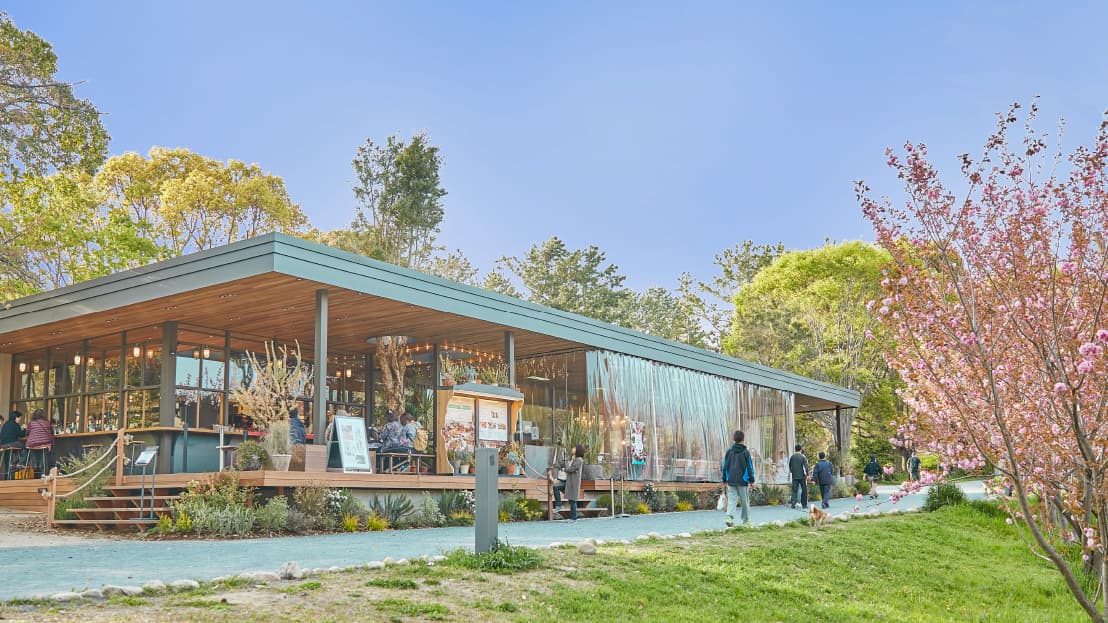
Overview
It is crucial to tap into the vitality of the private sector in order to solve urgent issues confronting Japan, i.e., the declining birth rate, graying population, aging infrastructure and fiscal strain. Projects implemented through collaboration between the public and private sectors, called public-private partnerships (PPP), include, as key methodologies, Park-PFI systems, designated manager systems, comprehensive management commissioned to the private sector, and projects for utilization of public real estate.
At NSRI, we support the operationalization of projects for facility and space renovation, facility relocation, as well as area management and regional revitalization, through comprehensive consulting services that not only apply our expertise in the fields of urban development, architecture and civil engineering, but also take financial and legal matters into consideration.
At NSRI, we support the operationalization of projects for facility and space renovation, facility relocation, as well as area management and regional revitalization, through comprehensive consulting services that not only apply our expertise in the fields of urban development, architecture and civil engineering, but also take financial and legal matters into consideration.
Features and Approaches
Provision of consulting services at every stage of a PPP project is what sets us apart from other companies. This includes providing evidence-based solutions using people flow data, urban data, and simulations; providing support for business plans using marketing approaches and revenue forecasting and analysis; and after the initiation of the project, monitoring for quality assurance and sound management. We not only engage in individual projects and facilities, but also provide comprehensive consulting services to support the implementation of projects covering entire communities or groups of facilities through medium- to long-term strategies and feasibility studies from technical aspects such as architecture, civil engineering, environment, and energy, which are the strengths of the Nikken Group.
Service Details 1
Support for implementation of PFI and PPP projects
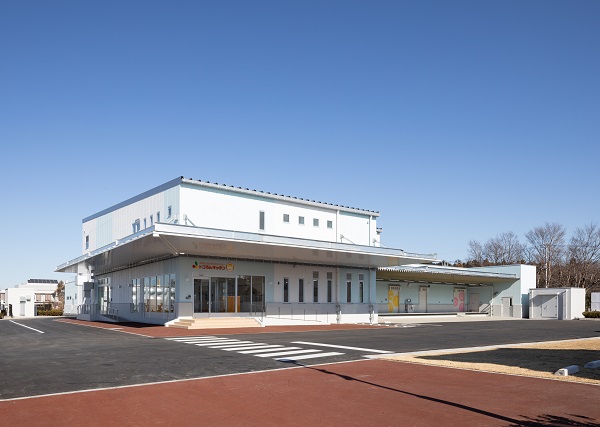
Public-private partnership (PPP) is a project approach to provide public services through the partnership of the public sector, centering on national and local governments, and the private sector, centering on companies.
We support the introduction of PFI and PPP in various fields such as cultural exchange facilities, tourism-related facilities, developments combining public and commercial facilities, educational facilities such as university and compulsory education facilities (e.g., school air conditioning) and school meal centers, public housing, halls and exhibition halls, urban development, and industrial facilities, with the aim to build a win-win relationship between the public sector and private companies.
We support the introduction of PFI and PPP in various fields such as cultural exchange facilities, tourism-related facilities, developments combining public and commercial facilities, educational facilities such as university and compulsory education facilities (e.g., school air conditioning) and school meal centers, public housing, halls and exhibition halls, urban development, and industrial facilities, with the aim to build a win-win relationship between the public sector and private companies.
Service Details 2
Renovation of urban parks
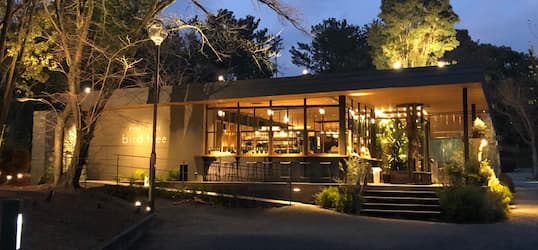
Projects are underway in urban parks across Japan to provide services including food and beverages, recreation, community building, and parenting support through utilization of the Park-PFI system and other approaches. In addition to designing concept plans and supporting public solicitation, we also support studies on renovating public spaces that consider not only the park itself, but also the spillover effects on development of the surrounding community. These include the formulation of project schemes using marketing approaches, simulation of people flow, income and expenditure projections, monitoring support during operations, and park management.
Service Details 3
New utilization of public spaces through ICT
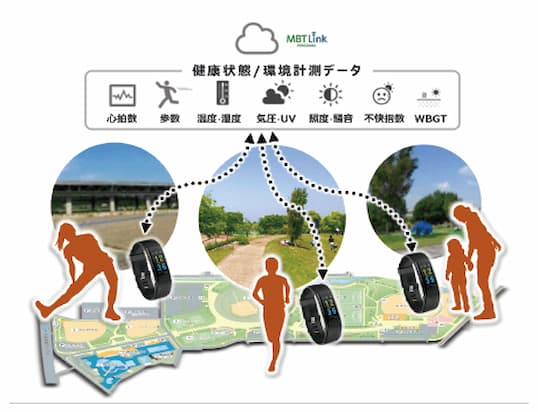
As new urban park services based on the COVID-19 pandemic experience, we provide support that meets the needs of our clients, such as studying the feasibility of PPP projects for the provision of real-time information services on indoor and outdoor crowding through the use of people flow sensors, and the provision of health advice services using smartwatches in collaboration with medical universities.
Service Details 4
Support for studies on PRE strategy (public facility relocation and public facility management)
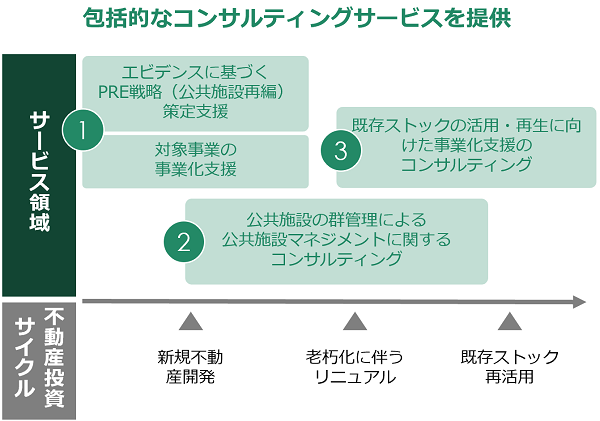
Public facility realignment and management are gaining importance from the perspective of future population decline and sustainable urban management. Utilizing our knowledge on urban development and urban policy, as well as diverse urban data, we analyze the current situation of public services by area and provide evidence-based solutions for studies on the best locations for public facilities. We also provide comprehensive consulting services for public real estate (PRE) strategies, including support for the implementation of projects that concern the utilization or revitalization of individual public facilities and for public facility management by grouping public facilities.
Service Details 5
Study on community development using government-owned land
As realignment of public facilities advances, it will become important to effectively utilize idle government-owned land, such as the former sites of schools that had once served as centers of the community.
Rather than simply promoting private sector use, we support the promotion of projects that turn these plots into centers for community development, including public land utilization schemes that would have the use of idle public land lead to local revitalization, and operation schemes that are also linked to area management.
Rather than simply promoting private sector use, we support the promotion of projects that turn these plots into centers for community development, including public land utilization schemes that would have the use of idle public land lead to local revitalization, and operation schemes that are also linked to area management.
Service Details 6
Regional revitalization
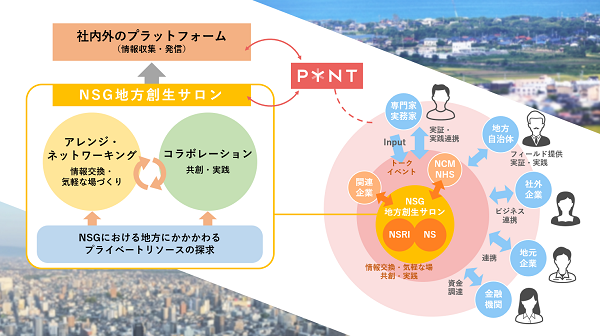
It has been projected that by 2050, Japan's population will drop to about 100 million, and with the exclusion of Tokyo, 46 prefectures will see a decline in population, with nearly half of Japan's municipalities at risk of extinction. We will propose ideal forms for regional revitalization by combining NSRI domains, including natural revitalization, urban management, public-private partnerships, carbon neutrality, and mobility.
In collaboration with PYNT, we have established a regional revitalization salon as a voluntary, interdepartmental initiative of the Nikken Group to promote arrangements, networking and collaboration with various stakeholders.
In collaboration with PYNT, we have established a regional revitalization salon as a voluntary, interdepartmental initiative of the Nikken Group to promote arrangements, networking and collaboration with various stakeholders.